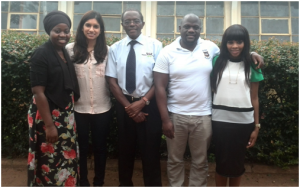 The past few decades have been marked by unprecedented interest in evidence based medicine (EBM), and a focus upon the use of innovative methods and protocols to provide valid and reliable information for healthcare (Greenhalgh, 2010). Evidence based healthcare has been indicated to be the most appropriate way of ensuring that patients receive the most effective care possible (Greenhalgh, 2010). Consequently, healthcare decisions are increasingly being based on research derived evidence, rather than expert opinion or clinical experience alone (Greenhalgh, 2010).
The past few decades have been marked by unprecedented interest in evidence based medicine (EBM), and a focus upon the use of innovative methods and protocols to provide valid and reliable information for healthcare (Greenhalgh, 2010). Evidence based healthcare has been indicated to be the most appropriate way of ensuring that patients receive the most effective care possible (Greenhalgh, 2010). Consequently, healthcare decisions are increasingly being based on research derived evidence, rather than expert opinion or clinical experience alone (Greenhalgh, 2010).
(Image: The UK team after meeting with Professor James Tumwine (in the centre) at Makerere University College of Health Sciences)
The use of evidence based healthcare treatments in low income countries can be viewed as controversial, because treatments are typically developed and transported from high resource, “Western” countries or contexts, which are culturally and contextually distinct (World Health Organization, 2010). However, it’s also arguable that efforts to address the treatment gap in low income countries should build and benefit from evidence in other settings, including treatments developed in high resource countries.
To adequately address the substantial health treatment gap in low income countries, there is a need to encourage scientific research that evaluates the efficacy of health treatments in low income countries, according to the criteria of EBM. If this could be achieved, we would have strong supporting evidence for the treatment of health disorders, which revolves chiefly around well controlled clinical trials, including placebo controlled trials (World Health Organization, 2010).
Given the need for both fidelity and adaptation when implementing evidence based treatments in low income countries, it could be critical to work collaboratively with several stakeholders in both high and low income countries, so that the EBM paradigm applied is still culturally specific.
The above argument was the thinking behind the development of a Centre for Evidence Based Medicine at Makerere University College of Health Sciences in Uganda, formed in partnership with the Royal Society of Medicine, the Uganda Diaspora Health Foundation (UDHF), and the Centre for Evidence Based Medicine at Oxford University—and supported by the Tropical Health & Education Trust (THET). The overall objective of this partnership is to assess the need for a collaborative training programme aimed at improved EBM knowledge and skills among students and faculty at Makerere University College of Health Sciences. The partnership also hopes to find ways to address any gaps innovatively and by building on student led partnership.
The project will be implemented under two phases, including; (1) Enhancing research skills training through the “Training of Trainers” model. There will also be a pilot project, which gives tablets to medical students to improve their communication skills and access to evidence based research during the Community Based Education and Services programme—an off-campus learning course, which combines educational and clinical/community objectives, and which provides real life experiences for students.
Tablet devices will give them remote access to e-resources; to practice protocols for common conditions; to reference information that can assist with diagnostic and intervention approaches; and access to platforms for supervision, so that students can communicate with faculty even when in remote areas.
The second phase will be the monitoring and evaluation of the project objectives and goals. Our funders THET value our planned EBM project, commenting that “THET’s experience shows that partnership projects, such as this one, are an effective means to exchange professional experiences and approaches. Drawing on the expertise available in the UK and Uganda, peer to peer collaboration can play a crucial role in assessing organisational capacities and point to innovative ways to address gaps.”
This article was co-authored by:
Moses wasswa Mulimira is a post graduate research student in evidence based healthcare studies, Oxford University. He is the co-founder of the Uganda Diaspora Health Foundation.
Mariam Namulindwa Aligawesa is co-vice chair at the Butabika-East London Link. She is co-founder of the Uganda Diaspora Health Foundation.
Edward Kakooza works at Makerere University College of Health Sciences.
Lalitha Bhagavatheeswaran is head of global health, the Royal Society of Medicine.
We have read and understood BMJ policy on declaration of interests and declare the following interests: None.